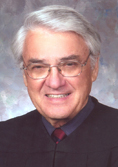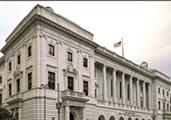© 2016 The Texas Lawbook.
By Mark Curriden
(Dec. 8) – Just as Hillary Clinton relied on a blue wall of states in her bid to be president, Trinity Industries believed the U.S. Court of Appeals for the Fifth Circuit was its protective barricade against a massive $663 million False Claims Act judgment facing the Dallas-based company.
The Fifth Circuit, after all, is the most conservative, pro-business federal appeals court in the country. The court’s jurists are no fans of big jury verdicts and almost always oppose expanding litigation rights to plaintiffs.
Going into oral arguments this week, Trinity had an additional reason to believe the appeals court would likely reverse the East Texas jury verdict: one of the three judges hearing the appeal had issued a written opinion prior to trial expressing doubt about the validity of the entire case.
But for 55 minutes Wednesday afternoon, the three-judge panel appeared to be more of a buzz saw than a shield for Trinity.
Questions and statements from judges during oral argument do not always indicate how courts will rule, but the truth is the hearing did not go well for Trinity.

In fact, it was the court’s two conservative judges – Judge E. Grady Jolly and Judge Patrick Higginbotham – who seemed to express the most doubt and have the most questions about Trinity’s arguments. Judge James E. Graves Jr. was also part of the panel.
Gibson Dunn partner James Ho, who represents Trinity, told the panel that Trinity’s changes to the guardrails that it failed to report to federal highway officials were minor and thus immaterial.
“You say they are minor and they say they are killer,” Judge Higginbotham shot back.
This litigation started in 2012 when Joshua Harman, a competitor-turned-whistle-blower, sued Trinity under the FCA, claiming the company shrank its popular ET-Plus highway guardrail system in 2005 from five inches wide to four inches in order to save $50,000 a year in costs.
Harmon’s lawyers argue that Trinity failed to inform the Federal Highway Administration about the changes, as required by law. Those changes, Harmon claims, “had a devastating impact” on the guardrail’s performance and led to car accident victims being killed or maimed.
The jury ruled against Trinity in 2014. Months later, the federal judge slapped the company with a $663 million judgment – the largest in the history of the FCA – and opened the door to a flood of lawsuits that seek billions of dollars in damages against the company.
During oral arguments, Ho tried time and time again to get the judges to focus on broad legal principle instead of the specific facts in the highway guardrail case.
“The federal government has repeatedly confirmed that it wants this product, approves this product and continues to purchase this product, Ho told the three-judge panel. “It does so to this day. That should end this case. After all, there is no materiality if the federal government continues to approve the product, and that is what we have here.”
But less than a minute into oral argument, Judge Higginbotham interrupted, pointing out that he had actually read the trial transcripts, which he admitted was usual for an appellate judge to do, and that he was disturbed by the evidence against Trinity.

“Was there testimony or evidence that these design failures caused accidents?” Judge Jolly asked Ho.
“There is the allegation and there is a dispute,” Ho responded. “We need to elevate above this scientific dispute you shouldn’t be involved in.”
Ho again noted that the FHWA approved the guardrails for federal reimbursements and continues to do so.
“The arguments you are making are not necessarily a winning argument,” Judge Jolly responded. “These are arguments that were made by the jury. We have to get into the weeds, but the jury has already been down in the weeds.”
Ho agreed that the appellate court should not be “down in the weeds” regarding the facts in the case, but instead focus on the broader legal issues.
“There is no materiality when the government approves,” Ho again argued.
But once again, the judges dove into the evidence presented at trial.
“They respond that the Highway Administration did not have the full facts at the times that they approved … that you had concealed some of the facts,” Judge Jolly countered. “The jury heard the evidence, heard your experts and they heard their experts and they decided against you.”
Then, Judge Jolly seemed to agree with Judge Higginbotham’s statement that materiality and causation are connected.
 “I want to know where the fraud is. How was the government defrauded?” Judge Jolly said. “If the evidence shows that the accidents that were introduced in this case were caused by the changes that were made without the approval of the federal government, then that shows you that the government may have been defrauded.”
“I want to know where the fraud is. How was the government defrauded?” Judge Jolly said. “If the evidence shows that the accidents that were introduced in this case were caused by the changes that were made without the approval of the federal government, then that shows you that the government may have been defrauded.”George Carpinello, a partner at New York’s Bois Schiller & Flexner who represents Harmon, told the Fifth Circuit that neither Trinity or the FHWA “bothered to examined any of the accidents” that involved Trinity’s guardrails, but that the plaintiff’s experts did study the crashes.
“Our expert testified in detail of the changes, how each change effected how the changes ET Plus worked, how the head would lock up because they reduced the vertical size and reduced the exit gap,” Carpinello said. “We actually had two of them in the courtroom and you could see that you could stick your hand in one of them and you couldn’t stick your hand in the other one.”
Carpinello said that the experts testified that the changes by Trinity caused the problems.
“Trinity admitted at trial that the states would not have bought it without the government’s certification,” he said. “The FHWA did not have a slew of facts that the jury had in this case … The FHWA issued a finding that what Trinity did [in not disclosing the changes] was inadvertent. They said it was inadvertent because that it was [what] Trinity told them.
“But the evidence at trial was clear that it is not inadvertent,” Carpinello told the judges. “The jury didn’t believe that it was inadvertent.
“The law is on our side,” he told the judges.
“There’s some law on your side and some against you,” Judge Jolly shot back.
Judge Jolly, who asked equally tough questions of Carpinello, also noted that two federal government task forces reviewed the ET-Plus, conducted additional safety tests and then announced that the guardrails were still approved for use – evidence that was obviously not available for the jury to consider.
The panel has four options: affirm the verdict and the judgment; reverse the verdict and end the case; send the case back to the trial court for a new trial; or affirm the jury’s verdict but reduce the judgment.
Lawyers following the case say the judges’ interest and knowledge of the evidence in the case is unique.
“The panel was very engaged in the nuances of the factual record, which is atypical in my experience,” said Dallas lawyer Tom Melsheimer, an expert in FCA litigation. “It was clearly what appellate lawyers call a ‘hot panel.’”
© 2016 The Texas Lawbook. Content of The Texas Lawbook is controlled and protected by specific licensing agreements with our subscribers and under federal copyright laws. Any distribution of this content without the consent of The Texas Lawbook is prohibited.
If you see any inaccuracy in any article in The Texas Lawbook, please contact us. Our goal is content that is 100% true and accurate. Thank you.
